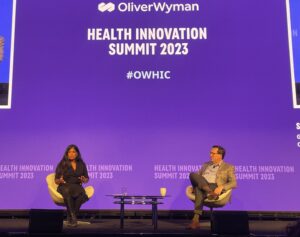
News
-
Brainstorm’s ALS Data Fail to Persuade FDA Advisors, Who Vote Down the Stem Cell Therapy
NurOwn, Brainstorm Cell Therapeutics’ experimental stem cell therapy for ALS, did not win the backing of an independent panel of FDA advisors. Many advisory committee members said they want to see more data from another clinical trial, the same guidance the FDA has given the biotech for nearly three years.
-
Payer’s Place: Dawn Maroney
Dawn Maroney, President, Markets of Alignment Health and CEO of Alignment Health Plan, to discuss how they are using technology to provide better service and care to consumers.
-
Cartwheel Snags $20M For School-based Mental Health Services
Cartwheel, a startup that partners with school districts to provide virtual mental health services, raised $20 million in Series A funds. The company is working with about 50 school districts and charter school networks across Massachusetts, Illinois, New York, Rhode Island and Connecticut.
-
Consumer / Employer, Health Tech
Costco Takes On Healthcare, Though Differently From Other Retailers, Experts Say
Costco is partnering with Sesame to offer Costco Members discounted pricing on virtual health services, including primary care and mental health. But the move is a little different from other retailers like CVS Health and Walgreens.
-
After NASH Hopes Are Dashed, Intercept Pharma Agrees to $794M Buyout
Intercept Pharmaceuticals’ acquisition by Alfasigma comes three months after the FDA again rejected the biotech’s drug as a treatment for the fatty liver disease NASH. But Intercept still has rare liver disease assets, and Italy-based Alfasigma says acquiring the company will help it expand in gastroenterology and hepatology.
-
Intermountain CEO: You Don’t Have To Be a Payvider to Reach Scale in VBC
The advancement of value-based care cannot and should not exist solely in a payvider model, Intermountain Health CEO Rob Allen argued in an interview last week. Having its own health plan made things “a little easier” when Intermountain began getting serious about at-risk contracts, but achieving success in value-based care “is more about your commitment to the approach” and forging strong relationships with payers of all types.
-
Digital Therapeutics: A Panacea for Care or Overvalued Health Tech?
Digital therapeutics will be one of the topics discussed at INVEST Digital Health scheduled for October 26 at Health Wildcatters headquarters in Pegasus Park in Dallas. Register today!
-
Pharma, Artificial Intelligence, BioPharma
Novo Nordisk Turns to Flagship’s Valo Health for AI-Driven Cardio Drug R&D
Novo Nordisk is paying Valo Health $60 million up front to gain three preclinical cardiovascular disease programs. Milestone payments for those programs and others covered under the artificial intelligence drug discovery pact could reach up to $2.7 billion.
-
Applying Remote Patient Monitoring to Surgery Prep and Recovery, Oncology and Women’s Health
Join us to learn about the latest trends in remote monitoring and how to extend its benefits beyond chronic conditions to more patients – all while using fewer staff resources.
-
Contamination Risk Sparks a Recall of GSK, Scynexis Antifungal Drug
Scynexis said no adverse events or contamination problems have been reported for Brexafemme, an antifungal approved for treating vaginal yeast infections. The biotech said the risk of cross-contamination stems from the processes of the small molecule’s third-party manufacturer.
-
Startup Syntax Bio Leverages CRISPR to Transform Cell Therapy Manufacturing
Syntax Bio’s technology platform uses CRISPR to direct stem cells to become a desired cell type in a process that’s more scalable and less expensive than current methods. The startup is raising a Series A round of financing to further demonstrate the potential of its technology.
-
Zocdoc Takes Aim At Phreesia, NexHealth With New Free Suite of Patient Engagement Tools
Zocdoc launched a new suite of tools to compete with the solutions sold by Phreesia, NexHealth and Solutionreach. The product suite, which is free for any provider to use, includes tools to streamline the patient intake process, facilitate online scheduling and enable video visits.
-
Equip Expands Care to Adults, Banks Investment From General Catalyst
San Diego-based Equip, which was founded in 2019, previously focused on those ages 6 to 24. The startup is now expanding to serve people of all ages, it announced Tuesday.
-
Hospitals Should Take A Page Out of Amazon’s Digital Engagement Playbook, Argues Providence Digital Chief
In order for health systems to “not be commoditized fully,” they need to collect data to know their patients’ behaviors better and build stronger relationships with them, argued Sara Vaezy, Providence’s chief strategy and digital officer. Consumer brands like Amazon have been doing this for years so they can deliver personalized experiences to their users, and it’s time hospitals take a page out of their playbook, she said.
-
How Genome Sequencing Can Broaden the Scope of Newborn Screening
Standard newborn screening can detect dozens of inherited diseases, but genomics technology enables testing for hundreds of them. A North Carolina program evaluating the feasibility of bringing genomics to newborn screening is expanding with an initial goal of testing 5,000 babies in the next year.
-
RFID with Barcode Medication Systems: Boosting Hospital Efficiency and Cost Savings
This article explores the benefits of implementing RFID in healthcare settings and how hospitals can gradually transition from barcode to RFID-enabled medication systems, leading to substantial cost savings and improved patient care.
-
Once a Blockbuster Prospect, Is Travere’s Kidney Drug on Track to Become a Bust?
Seven months after Travere Therapeutics’ flagship drug received accelerated FDA approval in a rare kidney disease, the molecule has fallen short of the key goal of its confirmatory test. It’s the small molecule’s second Phase 3 failure this year.
-
7 AI Pitfalls That Hospitals Should Avoid
As hospitals across the nation adopt more and more AI technology, there are some common hazards of which they should be wary. During a conference presentation on Tuesday, healthcare AI expert Suchi Saria laid out seven AI pitfalls hospitals should look out for — some of these include being duped by Big Tech companies’ marketing strategies and focusing too much on administrative use cases.




































